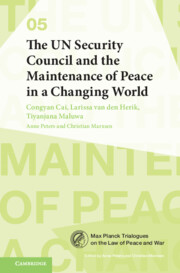
-
Select format
-
- Publisher:
- Cambridge University Press
- Publication date:
- February 2024
- February 2024
- ISBN:
- 9781009423458
- 9781009423472
- 9781009423441
- Creative Commons:
-
This content is Open Access and distributed under the terms of the Creative Commons Attribution licence CC-BY-NC-ND 4.0.
https://creativecommons.org/creativelicenses - Dimensions:
- (229 x 152 mm)
- Weight & Pages:
- 0.61kg, 322 Pages
- Dimensions:
- (229 x 152 mm)
- Weight & Pages:
- 0.47kg, 322 Pages
- Series:
- Max Planck Trialogues (5)
Book description
How can the UN Security Council contribute to the maintenance of international peace and security in times of heightened tensions, global polarisation, and contestation about the principles underlying the international legal and political order? In this Trialogue, experts with diverse geographic, socio-legal, and ideational backgrounds present their perspectives on the Security Council's historic development, its present functions and deficits, and its defining tensions and future trajectories. Three approaches engage with each other: a power-focused approach emphasising the role of China as an emerging actor; an institutionalist perspective exploring how less powerful states, particularly the elected members of the Security Council, exert influence and may strengthen rule-of-law standards; a regionalist perspective investigating how the Security Council as the central actor can cooperate with regional organisations towards maintaining international peace and security. This title is also available as Open Access on Cambridge Core.
Contents
Full book PDF-
The UN Security Council and the Maintenance of Peace in a Changing World
pp i-ii -
-
- You have access
- Open access
- HTML
- Export citation
-
-
Max Planck Trialogues on the Law of Peace and War - Series page
pp iii-iv -
-
- You have access
- Open access
- HTML
- Export citation
-
-
The UN Security Council and the Maintenance of Peace in a Changing World - Title page
pp v-v -
-
- You have access
- Open access
- HTML
- Export citation
-
-
Copyright page
pp vi-vi -
-
- You have access
- Open access
- HTML
- Export citation
-
-
Contents
pp vii-x -
-
- You have access
- Open access
- HTML
- Export citation
-
-
Introduction
pp 1-17 - The UN Security Council’s Four Defining Fields of Tension
-
-
-
- You have access
- Open access
- HTML
- Export citation
-
-
1 - The UN Security Council: Maintaining Peace during a Global Power Shift
pp 18-108 -
-
-
- You have access
- Open access
- HTML
- Export citation
-
-
2 - The UN Security Council: A Reflection on Institutional Strength
pp 109-185 -
-
-
- You have access
- Open access
- HTML
- Export citation
-
-
3 - The UN Security Council: Between Centralism and Regionalism
pp 186-277 -
-
-
- You have access
- Open access
- HTML
- Export citation
-
-
Conclusion - Power, Procedures, and Periphery: The UN Security Council in the Ukraine War
pp 278-298 -
-
-
- You have access
- Open access
- HTML
- Export citation
-
-
Index
pp 299-310 -
-
- You have access
- Open access
- HTML
- Export citation
-
-
Books In The Series - Series page
pp 311-312 -
-
- You have access
- Open access
- HTML
- Export citation
-
Metrics
Altmetric attention score
Full text views
Full text views help Loading metrics...
Loading metrics...
* Views captured on Cambridge Core between #date#. This data will be updated every 24 hours.
Usage data cannot currently be displayed.
Accessibility standard: Unknown
Why this information is here
This section outlines the accessibility features of this content - including support for screen readers, full keyboard navigation and high-contrast display options. This may not be relevant for you.
Accessibility Information
Accessibility compliance for the PDF of this book is currently unknown and may be updated in the future.


